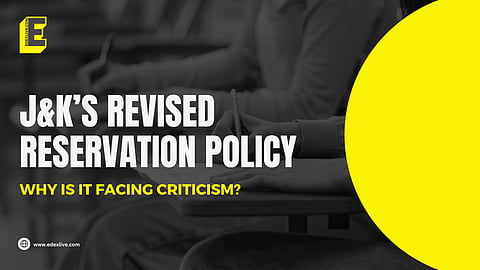

The latest counselling results for the National Eligibility cum Entrance Test - Postgraduate (NEET-PG) in Jammu and Kashmir have ignited a fresh debate over the state’s reservation policy.
The Jammu and Kashmir Board of Professional Entrance Examination (JKBOPEE) released a provisional list on November 29, revealing that only 29% of candidates belong to the open merit or unreserved category. This has sparked concerns among students from the region, who argue that the current reservation system is skewed and fails to reflect the state’s demographic and socio-economic realities.
With nearly 70 per cent of J&K's population belonging to the unreserved category and about 30 per cent from reserved categories, local youth are calling for a revision of the state's reservation policy.
The controversy traces back to March 15, 2024, when the Lieutenant Governor-led administration amended the Jammu & Kashmir Reservation Rules, 2005. The revised policy significantly reduced the number of open merit seats in both education and government jobs, triggering an uproar among students.
A larger issue
The issue extends beyond NEET-PG counselling. Students and government job candidates from Jammu and Kashmir are pointing out that under the new policy, opportunities for open merit students have drastically diminished.
In the NEET-UG counselling earlier this year, the students highlighted that only around 230 seats from the total 12,000 government medical seats were allocated to students from unreserved category, while the rest were taken up by students from reserved categories or non-domicile students.
Mir Zubair Nabi, a graduate from Jamia Milia Islamia and a Civil Services aspirant from Jammu and Kashmir, expressed his concerns, “After the new reservation policy, only about 30 per cent of the seats have been left for students from unreserved category. Over 70 per cent of the population is fighting for these seats. No matter which department released the notification, the unreserved candidates will only have 20-30 per cent of the opportunities.”
In another such case, over 5.5 lakh candidates appeared for the Police Constable recruitment examination in J&K which was held after a gap of eight years in the union territories for 4,002 posts. Out of these, around 3.5 lakh candidates are from unreserved category while only about 1,200 posts are available for open merit.
Protest in New Delhi
Now, to highlight their concerns, students from Jammu and Kashmir will be protesting at Delhi’s Jantar Mantar on December 14 to demand review and revision of the new reservation policy. The protest is being organised by the Jammu and Kashmir Students Association (JKSA).
Nasir Khuehami, National Convenor of JKSA, said, “We demand a meritocratic system that uplifts those in genuine need while providing equal opportunities for all deserving candidates. We are not against reservation or any particular caste. We want the government to address their issues but not at the cost of open merit students. We want the administration to keep the policy balanced, and conduct a thorough review of the current policy that ensures justice and equity for everyone.”
During the assembly elections in the union territory in September-October 2024, the elected political party, Omar Abdullah-led National Conference had promised in his election manifesto to review the new reservation policy if elected to power.
However, the state administration is yet to take any action.
“We want the J&K government to fulfill its electoral promise that they made before the elections. We also demand a caste census in J&K to determine the actual demographic data. So that, on basis of that, reservation policy can be developed,” added Nasir.
